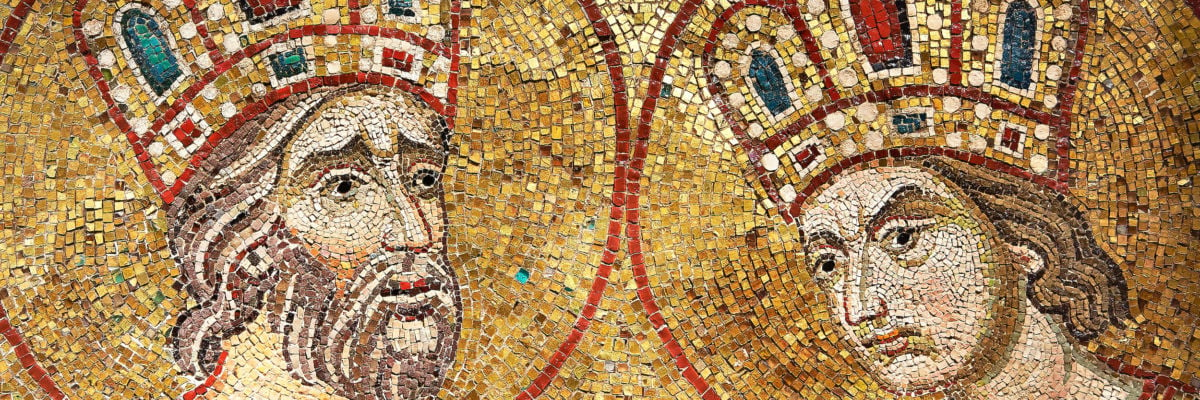
Homily for the Seventeenth Sunday in Ordinary Time, Year A
God said to him:
“Because you have asked for this—
not for a long life for yourself,
nor for riches,
nor for the life of your enemies,
but for understanding so that you may know what is right—
I do as you requested.
I give you a heart so wise and understanding
that there has never been anyone like you up to now,
and after you there will come no one to equal you.”-1 Kings 3:11-12
In St. Mark’s Basilica in Venice there is a mosaic of King Solomon with a halo of holiness, made in the 1100s. Now, the 1100s were part of period of a great reform and flourishing of monastic and canonical life begun in the previous century by Pope St. Gregory VII. Abbeys with their cloisters rose throughout Europe under such great founders as St. Bruno, St. Bernard, and St. Norbert. These converts to the life of the early church in Jerusalem, a life lived in common with common property and celibacy, favored the writings attributed to King Solomon for their spiritual reading, just as they favored the psalms of his father King David for their prayer.
Now King Solomon, as we know, did not end his life as well as he had begun. Though gifted with wisdom above others, he gave in to his lust for women and even allowed the promotion of their pagan worship. The scriptures do not narrate any conversion at the end of his life.
Our monastic writers saw this as a warning to themselves. The wise Solomon, on whose words they meditated in the Proverbs and in the Song of Songs, fell away from the whole-hearted service of God with which he began. His sensuality and human respect got the better of him. So they began to wonder: was Solomon saved? Several treatises were written on this topic. All answered in the negative. Horrible to imagine, and yet it was a fearful warning to the religious of the time to remain faithful to their commitments.
Of course, the mosaic in St. Mark’s shows that at the same time an earlier, more serene tradition continued. There he is a saint among the saints. And in the Eastern churches there never was this speculation on the fate of the great son of David. He was venerated as a saint, to be sure. This means he repented and was saved (probably after a good cleansing in purgatory!) and met the Savior, his descendant, on the first Holy Saturday, and he was given eternal bliss with all the rest.
The fact is, though, that any one of us can fall away from even the choicest of graces. After all, Lucifer was the greatest of the angelic host; Adam and Eve had the perfection of knowledge and no unruly passions to explain their fall from the heights of the original justice with which God endowed them. Noah, Moses, David, Peter, Judas all were given much, but has serious falls.
Fortunately for us, we are not fallen angels: since they are so unique individually and so intense in their choices, there is no possibility of their restoration given in revelation. Human beings, however, can be repaired, and on a grand scale.
Thus we have St. Paul’s reassuring words today in the epistle lesson from Romans:
We know that all things work for good for those who love God,
who are called according to his purpose.
For those he foreknew he also predestined
to be conformed to the image of his Son,
so that he might be the firstborn
among many brothers and sisters.
And those he predestined he also called;
and those he called he also justified;
and those he justified he also glorified.
But not all are saved. This is the witness in the scriptures. Some want to view damnation just as a possibility with the hope that no one, no human being at least, will be in hell for all eternity. Yet this position doesn’t really solve the theological problem. It remains true in any case that God could justly have condemned the human race, and none of us can reach eternal life without the special intervention of God’s mercy. If few are lost and most saved, or most lost and a few saved, the problem is the same.
God with his almighty power and perfect justice is a God who can permit the loss of some souls or all of them. This is a mystery in which we cannot peer too closely—the “mystery of iniquity” whereby human freedom can resist God’s grace of God all the way to the end. Horrible, yes, but clearly possible, and depicted in the scriptures, and right here today in today’s Gospel:
Jesus said to his disciples:
“The kingdom of heaven is like a treasure buried in a field,
which a person finds and hides again,
and out of joy goes and sells all that he has and buys that field.
Again, the kingdom of heaven is like a merchant
searching for fine pearls.
When he finds a pearl of great price,
he goes and sells all that he has and buys it.
Again, the kingdom of heaven is like a net thrown into the sea,
which collects fish of every kind.
When it is full they haul it ashore
and sit down to put what is good into buckets.
What is bad they throw away.
Thus it will be at the end of the age.
The angels will go out and separate the wicked from the righteous
and throw them into the fiery furnace,
where there will be wailing and grinding of teeth.”
Still, in this passage we have a motive for the greatest of consolations and deep encouragement. Who is the one who sells all he has and buys the pearl of great price? It is in the first place our Savior Jesus Christ himself. He put aside all his heavenly glory and “took the form of a slave” in order to ransom us from eternal death. He earnestly desires, and at the price of the offering of his Precious Blood and bodily life, along with the holiness of his soul and the infinite love of his divinity, to save us.
Even if we have fallen away from our first love, once or many times— even if gravely— if we love him “all things work together for the good” and our falls become new events of saving grace. All we have to do is to reach out and pray, “O my Jesus, save me from the fires of hell and lead all souls to heaven, especially me, most in need of thy mercy!”
Then we will have the joy of joining the great sinners who greatly and constantly repented in the kingdom, the pearl of great price, the eternal happiness with the Master of our souls, who has ordered even our sins toward our salvation. We will sing, with the sinner King David, “The mercies of the Lord I will sing forever.”



